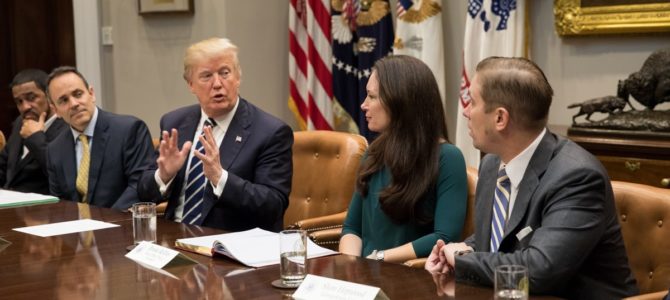
Maybe it was Colonel Mustard in the conservatory with the revolver. Or Professor Plum in the library with the candlestick.
The story behind the Obamacare bailout proposed in last week’s budget has taken on a mysterious tone, akin to a game of Clue. My Thursday story focusing on the role played by White House Domestic Policy Council Chair Andrew Bremberg prompted pushback from some quarters about the actual perpetrator of the proposal. As a result, I spent a good chunk of Friday afternoon trying to gather more facts—and found definitive ones hard to come by.
On Friday, some sources told me they were “99.9 percent certain” Bremberg had nothing to do with the proposal, and only learned about it after the administration released the budget publicly last Monday. I also heard comments suggesting Bremberg had proposed settling insurers’ lawsuits for some time, as one way to signal to insurers that the administration would offer them a “stable” environment in the Obamacare exchanges, consistent with my prior story.
As to the accuracy of my initial theory, people I trust and respect arrived at strikingly different views. However, I found surprising unanimity on one count: No one—but no one—wants to take credit for inserting the proposal to pay $11.5 billion in risk corridor claims. As someone told me: “You raise a valid question. If Andrew Bremberg didn’t insert the proposal into the budget”—and this person didn’t think he did—“then how did it get in there?”
Therein lies a huge problem. To call the inclusion of a $11.5 billion proposal in the president’s budget that no one in the administration seemed to know about, or wants to take credit for, a prime example of managerial incompetence would put it mildly. Either career staff inserted it in the budget, and the political staff did not have the antennae or bandwidth to understand its consequences and take it out, or a few political appointees and career staff hijacked the budget process, with most other individuals unaware of the situation until the budget’s public release.
To borrow a politically loaded phrase, someone—or a group of someones—colluded to get this language included in the budget. Its inclusion could cost federal taxpayers literally billions of dollars.
Why It Matters
Last month, a three-judge panel at the Court of Appeals for the Federal Circuit heard oral arguments in insurers’ cases against the federal government for unpaid risk corridor claims. (For more background on the issues in the risk corridor lawsuits, see my March 2017 testimony before a House Judiciary subcommittee.) The Justice Department argued on behalf of the federal government that, in enacting appropriations language prohibiting taxpayer dollars being used for risk corridor claims, Congress had abrogated any obligation to pay insurers’ remaining claims under the risk corridor program.
By submitting a budget proposal to “request mandatory appropriations for the risk corridors program,” the White House completely undermined and undercut the arguments its own Justice Department had made in court a few short weeks ago, that the federal government owes insurers nothing.
In other words, whomever inserted this policy U-turn into the budget, just as the judges ponder a ruling in the insurer lawsuits, may have effectively “tanked” the government’s case. Either by leading to an adverse ruling, or by prompting the Justice Department to settle the case at a much higher cost, this move could cost taxpayers billions.
A Pro-Life Administration, Or Not?
Unfortunately, it gets worse. While the budget did include new funds for insurers, including the controversial risk corridors bailout described above, it did not include a single word proposing that such funds prevent taxpayer dollars from going to plans that cover abortion.
In the debate on bailing out Obamacare, not a single Republican leader—from House Speaker Paul Ryan to the administration—has called the inclusion of robust pro-life protections a must for any legislation giving taxpayer funds to insurers. Take, for instance, Sen. Lamar Alexander, who after admitting in October he hadn’t even considered the issue, said an executive order could add pro-life protections—even though Republicans criticized an executive order as insufficient when President Obama used one to appease pro-life Democrats at the time of Obamacare’s passage.
There’s a reason for the deafening silence: Republicans know that any legislation that funds insurers and provides robust pro-life protections will not pass. Democrats will object to its inclusion. Given the choice between passing up on an Obamacare bailout or abandoning their pro-life principles, Republicans have given every expectation that they will choose the latter course. (They shouldn’t bail out Obamacare regardless, but that’s a separate story.)
Regardless of who proposed these, it doesn’t take a detective to understand how a policy reversal that could cost taxpayers billions and a pending U-turn by Republicans to fund abortion coverage represent a major one-two punch against conservatives. But the mysterious origins and mangled management of the risk corridor proposal adds a further layer of insult to injury, a triple whammy of a tough week for the administration.
Mr. Jacobs is founder and CEO of Juniper Research Group, a policy consulting firm based in Washington. He is on Twitter: @chrisjacobsHC.









